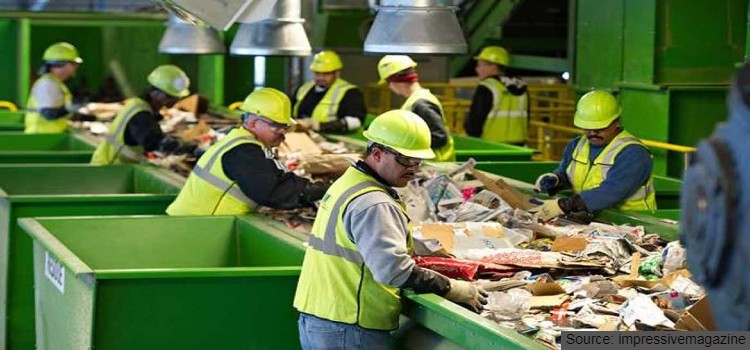
Netherlands Waste Management Market by Waste Type (Municipal Solid Waste (MSW) or Household, Industrial, and Commercial) and by Waste Treatment (Composting, Incineration, Controlled Landfill, Uncontrolled Landfill, Sanitary Landfill, Open Dump, and Recycling)– Opportunity Analysis and Industry Forecast, 2024 – 2030
Industry: Energy & Power | Publish Date: 08-Oct-2024 | No of Pages: 103 | No. of Tables: 72 | No. of Figures: 37 | Format: PDF | Report Code : EP2738
Netherlands Waste Management Market Overview
The Netherlands Waste Management Market size was valued at USD 9.63 billion in 2023, and is predicted to reach USD 14.08 billion by 2030, at a CAGR of 4.50% from 2024 to 2030.
The Netherlands waste management market involves a wide range of services and activities aimed at managing and mitigating the impact of waste generated by various sectors including residential, commercial, industrial, and healthcare. It includes the collection, transportation, processing, recycling, and disposal of waste materials in a manner that is environmentally responsible and sustainable. The market also involves the development and implementation of technologies and practices that promote waste reduction, resource recovery, and the safe handling of hazardous materials.
Key components of the waste reduction market include waste collection services, recycling facilities, waste-to-energy plants, landfill operations, and environmental consulting services. As awareness of environmental issues grows, the waste reduction market continues to expand, driven by growing population, technological advancements, and increasing public demand for sustainable waste solutions.
Urbanization in the Netherlands Drives Growth in the Waste Management Market
The rapid urbanization in the Netherlands is driving significant growth in the waste management market. As urban areas expand and population densities increase, the volume of waste generated rises that necessitates the need for efficient waste handling solutions. According to the World Bank Group latest report, the country’s urban population accounted for 16.65 million in 2023 as compared to 14.98 million in 2014 that is an increase of 11.1%. The growing urban landscape necessitates enhanced waste recycling systems to ensure sustainability and maintain environmental standards.
Innovative Product Launches by Key Players in the Country Boost the Netherlands Waste Management Market Growth
The innovative product launches by key market players further fuels the growth of the Netherlands waste management market trends. The introduction of cutting-edge technologies and advanced solutions enhances operational efficiency and meets evolving customer needs. For instance, June in 2023, Terra Circular collaborated with Braskem and launched Upsyde to boost the circular economy and to recycle 23,000 tons of mixed plastic waste every year. As companies continue to push the boundaries with their product offerings, the market experiences accelerated growth and increased competitiveness.
Regulatory Framework and Compliance Costs Restrains the Market Growth
The complex regulatory framework, enforced by national and local authorities, imposes high compliance costs and operational hurdles that hinders the market growth. These regulations, aimed at promoting environmental sustainability and reducing landfill dependency, demand substantial investments in advanced technologies and infrastructure upgrades. As a result, market participants face high operational costs to ensure compliance with waste segregation, recycling, and disposal standards. This burden is particularly challenging for smaller players, as navigating the intricate layers of regulations not only leads to increased compliance costs but also creates operational hurdles, further hindering market growth.
The Adoption of Waste-To-Energy Technologies Creates Future Growth Opportunities in the Market
The adoption of waste-to-energy technologies such as incineration, anaerobic digestion, and gasification presents a significant growth opportunity for the waste management market as these technologies convert waste materials into usable energy, reducing landfill dependency and contributing to sustainable energy generation.
By transforming waste into a valuable resource, waste-to-energy solutions promote environmental sustainability and drive market expansion. This innovative approach aligns with global trends toward circular economy practices and offers economic benefits by generating energy from waste that creates a promising avenue for growth of the waste reduction sector.
Competitive Landscape
The promising key players operating in Netherlands waste management industry includes Renewi, Veolia Environnement S.A., Attero, AVR (Afvalverwerking Rijnmond), NVRD (Nederlandse Vereniging voor Afval- en Reinigingsmanagement), Twence, HVC Groep, Shanks Nederland, AEB Amsterdam, Remondis, and others.
Netherlands Waste Management Market Key Segments
By Waste Type
-
Municipal Solid Waste (MSW) or Household
-
Food
-
Paper and Cardboard
-
Plastic
-
Glass
-
Metal
-
Others
-
-
Industrial
-
Manufacturing Waste
-
Construction & Demolition Waste
-
Agriculture Waste
-
Other Industrial waste
-
-
Commercial
By Waste Treatment
-
Composting
-
Incineration
-
Controlled Landfill
-
Uncontrolled Landfill
-
Sanitary Landfill
-
Open Dump
-
Recycling
Key Players
-
Renewi
-
Veolia Environnement S.A.
-
Attero
-
AVR (Afvalverwerking Rijnmond)
-
NVRD (Nederlandse Vereniging voor Afval- en Reinigingsmanagement)
-
Twence
-
HVC Groep
-
Shanks Nederland
-
AEB Amsterdam
-
Remondis
REPORT SCOPE AND SEGMENTATION:
|
Parameters |
Details |
|
Market Size Value in 2023 |
USD 9.63 billion |
|
Revenue Forecast in 2030 |
USD 14.08 billion |
|
Value Growth Rate |
CAGR of 4.50% from 2024 to 2030 |
|
Analysis Period |
2023–2030 |
|
Base Year Considered |
2023 |
|
Forecast Period |
2024–2030 |
|
Market Size Estimation |
Billion (USD) |
|
Growth Factors |
|
|
Companies Profiled |
10 |
|
Customization Scope |
Free customization (equivalent up to 80 working hours of analysts) after purchase. Addition or alteration to country, regional, and segment scope. |
|
Pricing and Purchase Options |
Avail customized purchase options to meet your exact research needs. |




 Speak to Our Analyst
Speak to Our Analyst
































